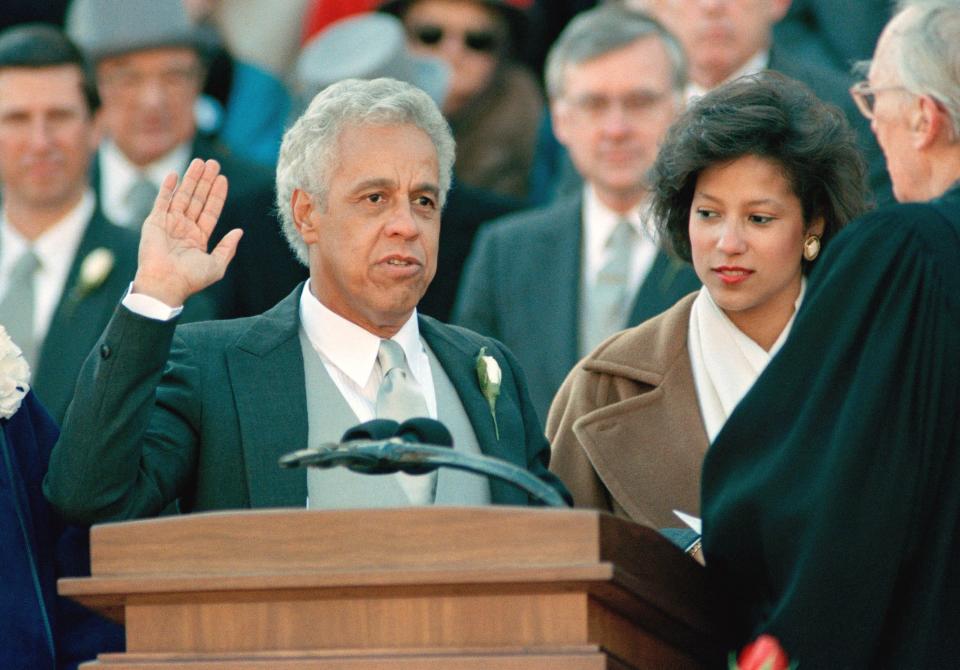How local candidates who never held office got elected. It's not uncommon
- Oops!Something went wrong.Please try again later.
- Oops!Something went wrong.Please try again later.
- Oops!Something went wrong.Please try again later.
- Oops!Something went wrong.Please try again later.
You don’t have to look very far to find a governor who never got elected before becoming governor. Outgoing two-term Republican Gov. Larry Hogan fit that description when he won Maryland’s top job in 2014.
Across the Potomac River from Southern Maryland, Republican Glenn Youngkin also never held elected office before becoming Virginia’s governor earlier this year. And Donald Trump famously became president in 2017 without having held any elected office.
Regardless of whether Republican Dan Cox or Democrat Wes Moore wins the election, Maryland’s next governor will be inaugurated without any experience in a statewide office. Currently, nearly a quarter of the nation’s current governors (12) have never held any elected office prior to obtaining the post, and Moore fits that description.
Political experience is not necessarily a prerequisite to being an effective leader, analysts say, but building a coalition is key.
Wilder ran for lieutenant governor first
Former Virginia Democratic Gov. L. Douglas Wilder took a 60-day, 3,600-mile road trip of Virginia in a borrowed station wagon during the summer of 1985 — just to become lieutenant governor.
“I made it a point to travel the state and to stay in no hotels, but to stay in the homes of the people that I met,” said Wilder, in an Oct. 20 interview. He said he was shocked how few people knew him despite serving the prior decade-and-a-half in the state legislature.
Carin Robinson, an associate professor of political science at Hood College in Frederick, Maryland, is seeing a similar dynamic of lack of name recognition of the gubernatorial candidates during the race this year. She cites just having one debate as a possible cause.
In addition to the barrier of name recognition, Wilder faced the hurdle of becoming the nation's first African American governor.
“I knew that to move up I needed to have an entry level test,” said Wilder, of his run for lieutenant governor, during a CBS interview that aired in 2000. He won the governorship four years after his road trip and became the nation's first African American governor in 1990.
Neither of Maryland’s current gubernatorial candidates have had such a statewide entry level test, but experts, including Wilder, say that is OK.

Now a professor at the school of government and public affairs named after him at Virginia Commonwealth University, Wilder said Youngkin’s election is an example that proves it’s not necessary to hold elected office first to be a successful governor. (Wilder was one of the former Virginia governors who advised Youngkin during the transition.)
Robinson said she does not see the candidates' lack of political experience as a "deal breaker" for voters in Maryland.
"It doesn't score you a lot of points to say, 'I'm a career politician,'" she said.
Building a coalition, and a cabinet is key
Key to running an administration is building an experienced staff who can effectively deal with policy.
“The kind of expertise that is expected of a modern political executive is whether they are able to build a coalition,” said Sunil Dasgupta, professor of political science at the University of Maryland, Baltimore County.
Dasgupta notes that Moore may have a larger pool of talent from which to draw based on support from moderate Republicans. Hogan has said publicly he will not support Cox, his party's nominee, for governor.
Moore, who comes with a military background, has never held elected office, and Cox served just one term in the state legislature after spending time as the president of a small town’s commission. Dasgupta said the lack of political experience is not necessarily a concern.
“There’s a learning curve for everybody,” he said. “Running for office and being in office are two vastly different things.”
Wilder suggested that the next governor make certain that people who are in the cabinet are like-minded.
"If they are not (of the same mindset)," he said, "then you're not obligated to keep them."
Different electorate, historic candidacies
Over 30 years after his road trip and being inaugurated as the nation’s first African American elected governor, Wilder said the electorate is different now than during his statewide tour.
“Things have changed to the extent that people are not surprised at someone of color being elected, or a female being elected,” Wilder said.
Moore would be the first African American governor in Maryland's history, and just the third elected in the nation’s history behind Wilder and former Massachusetts Democratic Gov. Deval Patrick, who held office from 2007 to 2015. Across the nation, four other African Americans are seeking governorships this year.
Moore’s running mate, former state Del. Aruna Miller, D-Montgomery, would be the first immigrant elected to the post, as would Cox’s running mate, Gordana Schifanelli. Miller is a native of Hyderabad, India, while Schifanelli hails from the Eastern European city of Belgrade, Serbia's capital. Miller also would be the first woman of color to be lieutenant governor in Maryland.
“You’re there to represent everybody, not just those who would identify with you by virtue of race or sex,” Wilder said. “The job is (to do) what’s in the best interest of the people of Maryland.”
He said that comes from listening to the people.
“Don’t put blame on anyone,” Wilder said. “Once you’re in the seat, the responsibility is yours.”
Dwight A. Weingarten is an investigative reporter, covering the Maryland State House and state issues. He can be reached at dweingarten@gannett.com or on Twitter at @DwightWeingart2.
This article originally appeared on The Herald-Mail: How some Maryland candidates who never held office got elected

